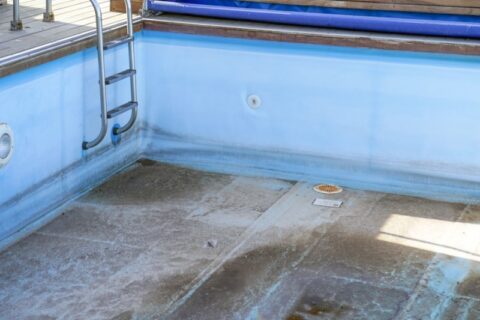What to Do About Pool Leaks
Does your pool seem to be losing water? The idea of a pool leak can fill any pool owner’s heart with dread, but don’t be too hasty in jumping to that conclusion. Pools do lose water through evaporation, and water tends to splash out when you’re using the pool. However, if you notice water pooling in your yard, cracks in the tile or concrete, or chemical levels that vary, you may very well have a pool leak.
- If you’re unsure whether it’s a leak or evaporation, try a bucket test. This is a very simple test, using just a five-gallon bucket and something to mark it, like a marker or duct tape. Fill the bucket with water from your pool and mark the top of the waterline. Then mark the top of the waterline in your pool. Place the bucket beside your pool for a day or two, and if the level of the pool has changed more than the level in the bucket, you probably have a pool leak.
- Do you know how to find a leak in a pool? Pool leak detection is not always easy, and it can sometimes be dangerous if the leak is near electricity, so it might be worth hiring someone to do this task for you. If you do decide to do it yourself, you’ll need to inspect the external pipes or plumbing, look for excess water in the yard or on the concrete, and troubleshoot common areas in the pool that may be prone to leaking. Look at the skimmer, the pool light, and the return interfaces for signs of a leak, and check the equipment pad to see if your filter, pump, heater, or another piece of equipment is causing the problem. Be very careful in this area, because it’s easy to be shocked by an exposed electrical wire that’s wet.
- Try the color test. This can be done with food coloring or special pool leak detection dye. Squirt a little bit of the color or dye into the water around integrated parts or plumbing fixtures, then notice the direction in which the dye is pulled. It may be helpful to wear goggles and a snorkel and watch the dye from inside the pool.
- Call in a professional. You may not find anyone listed under pool leak finders in the local directory, but a pool repair professional will be able to solve your problem. Your property insurance may cover pool leak repair, and it’s better to have the repair done by someone who knows how to do it effectively and safely, rather than risk doing it yourself.
When you need someone to help maintain or repair your pool, Millennium Pools and Spas can help. With over 30 combined years of experience in the pool industry, we provide a comprehensive range of pool services for both residential and commercial customers in Virginia, Washington DC, and Maryland. When you hire Millennium Pool Service, you get a well-qualified, industry-trained staff of pool contractors and technicians, services that are tailored to your needs, and a commitment to 100% customer satisfaction. Contact us for more information.

